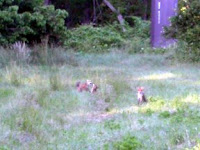Reynard in the Suburbs

Neighborhood walks have changed considerably since Henry Thoreau sauntered around Concord. He wrote, “I can easily walk, ten, fifteen, twenty, any number of miles, commencing at my own door without going by any house, without crossing a road except where the fox and mink do.” My family lives in a planned suburb, with asphalt walking paths winding through narrow woods between and behind close-packed houses. That’s at least more saunter-friendly than most sidewalk-deprived subdivisions, and we occasionally glimpse a fox crossing the road at night or hear one in the dark distance, a sound Thoreau described as “barking raggedly and demonically like forest dogs.” But we don’t expect to cross any mink or many fox trails on an evening’s stroll.
So imagine our surprise on Saturday’s walk when we spotted not one, but four red foxes cavorting in a nearby field. My husband rushed home for the camera, and for long minutes, we watched the animals play, spar, hunt, and watch us right back. They seemed to be a family of one tolerant, watchful parent and three curious, boisterous, well-grown pups. One pup stalked, pounced, and munched a snack-sized prey, and all three pounced on each other, dashed in and out of sight under thickets on the field’s edge, or just rolled in the grass, enjoying the day’s last sunshine. When my daughter moved slightly closer to take pictures, one pup stopped playing to stare directly at her. He didn’t seem frightened, just intrigued, and he stepped a bit closer for a better view of her, too.
As delightful as the experience was for my family, I couldn’t help but compare our fox encounter with one Thoreau describes in his journal. On January 30, 1841 Thoreau spied a fox in the snow and gave chase, “. . . I tossed my head aloft and bounded away, snuffing the air like a fox hound, and spurring the world and the Humane Society at each bound.” Thoreau felt wild enough himself to sample the fox’s wild existence in a pursuit he admits frightened it. Along the way, his experience of the fox was enriched not just by familiarity with their shared woods but by classical literature enlivening his imagination. He wrote, “It seemed the woods rang with the hunter’s horn, and Diana and all the satyrs joined in the chase.”
In contrast, my family stood still on the asphalt path, loathe to disturb the animals’ small oasis—a field undeveloped only because power lines stretch overhead. Quietly, we agreed the view “was just like watching Nature on t.v.” Once home again, I looked up Thoreau’s description of the fox he chased through the Concord snow and recognized the same animal we spied in Columbia—“He ran as though there was no bone in his back,” and “he took no step which as not beautiful.” In 160 years, the fox hasn’t changed. But we have.





2 comments:
What a beautiful essay! You reminded me of one of my own favorite quotes from Thoreau's journals, this one from Dec. 27, 1857: "Do not despair of life. Think of the fox, prowling in a winter night to satisfy his hunger. His race survives; I do not believe any of them ever committed suicide."
Thanks for another Thoreau fox quote. He must have loved 'em!
Post a Comment